The importance of robots
robot的好处英语作文
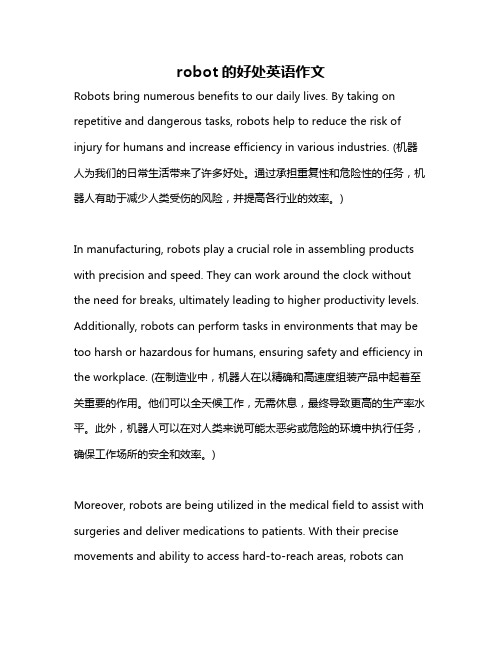
robot的好处英语作文Robots bring numerous benefits to our daily lives. By taking on repetitive and dangerous tasks, robots help to reduce the risk of injury for humans and increase efficiency in various industries. (机器人为我们的日常生活带来了许多好处。
通过承担重复性和危险性的任务,机器人有助于减少人类受伤的风险,并提高各行业的效率。
)In manufacturing, robots play a crucial role in assembling products with precision and speed. They can work around the clock without the need for breaks, ultimately leading to higher productivity levels. Additionally, robots can perform tasks in environments that may be too harsh or hazardous for humans, ensuring safety and efficiency in the workplace. (在制造业中,机器人在以精确和高速度组装产品中起着至关重要的作用。
他们可以全天候工作,无需休息,最终导致更高的生产率水平。
此外,机器人可以在对人类来说可能太恶劣或危险的环境中执行任务,确保工作场所的安全和效率。
)Moreover, robots are being utilized in the medical field to assist with surgeries and deliver medications to patients. With their precise movements and ability to access hard-to-reach areas, robots canimprove the accuracy of surgical procedures and reduce the risk of complications. This not only benefits patients by providing better healthcare outcomes but also alleviates the strain on healthcare professionals. (此外,机器人正在被用于医疗领域,协助手术和向患者输送药物。
机器人四英语作文
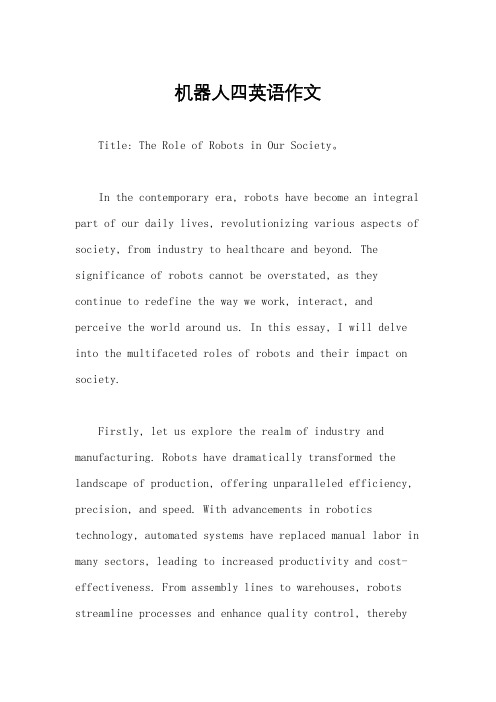
机器人四英语作文Title: The Role of Robots in Our Society。
In the contemporary era, robots have become an integral part of our daily lives, revolutionizing various aspects of society, from industry to healthcare and beyond. The significance of robots cannot be overstated, as they continue to redefine the way we work, interact, and perceive the world around us. In this essay, I will delve into the multifaceted roles of robots and their impact on society.Firstly, let us explore the realm of industry and manufacturing. Robots have dramatically transformed the landscape of production, offering unparalleled efficiency, precision, and speed. With advancements in robotics technology, automated systems have replaced manual labor in many sectors, leading to increased productivity and cost-effectiveness. From assembly lines to warehouses, robots streamline processes and enhance quality control, therebyreshaping the industrial landscape.Moreover, robots have made significant strides in the field of healthcare, contributing to improved patient care and medical outcomes. Surgical robots, for instance, enable surgeons to perform complex procedures with enhanced precision and minimal invasiveness. This not only reduces the risk of complications but also facilitates faster recovery times for patients. Additionally, robots are utilized in rehabilitation therapy, assisting individuals with mobility impairments to regain strength and independence. Through these applications, robots are revolutionizing healthcare delivery and promoting well-being across diverse populations.In the realm of education, robots are serving as invaluable tools for enhancing learning experiences. Educational robots, equipped with interactive features and customizable programming, engage students in hands-on activities and foster critical thinking skills. Whether used for teaching coding, science, or mathematics, these robots offer a dynamic approach to education that appealsto learners of all ages. Furthermore, robots are increasingly being employed in special education settings to support students with diverse learning needs, providing personalized assistance and fostering inclusive learning environments.Beyond their practical applications, robots are also influencing the social and cultural fabric of society. Humanoid robots, designed to mimic human-like behaviors and emotions, are sparking conversations about the nature of consciousness and the boundaries between humans and machines. While some view humanoid robots as companions or assistants, others express concerns about their potential impact on interpersonal relationships and societal norms. Nevertheless, the integration of robots into everyday life prompts us to reconsider what it means to be human and how we relate to non-human entities in an increasingly technologically mediated world.Furthermore, robots are playing a pivotal role in addressing societal challenges, ranging from environmental sustainability to disaster response. For instance,autonomous robots are utilized in environmental monitoring and conservation efforts, aiding scientists in gathering data and analyzing ecological trends. In disaster scenarios, robots equipped with sensors and cameras can navigate hazardous environments, providing crucial information to emergency responders and facilitating search and rescue operations. By leveraging robotics technology, we can enhance our capacity to tackle pressing global issues and build more resilient communities.In conclusion, robots have become indispensable agentsof change in our society, shaping industries,revolutionizing healthcare, transforming education, and challenging our perceptions of what it means to be human.As we navigate the ever-evolving landscape of technology,it is essential to harness the potential of robots responsibly, ensuring that their benefits are equitably distributed and aligned with our values and aspirations asa society. By embracing innovation and fostering collaboration between humans and robots, we can build a future that is not only technologically advanced but also inclusive, compassionate, and sustainable.。
英语作文Robots
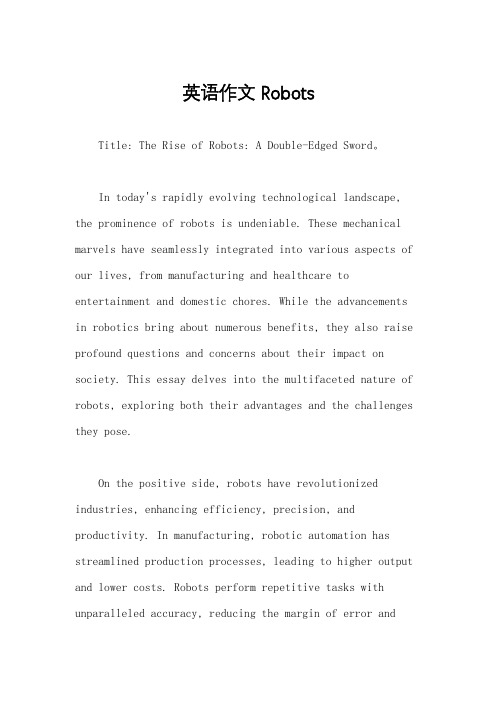
英语作文RobotsTitle: The Rise of Robots: A Double-Edged Sword。
In today's rapidly evolving technological landscape, the prominence of robots is undeniable. These mechanical marvels have seamlessly integrated into various aspects of our lives, from manufacturing and healthcare to entertainment and domestic chores. While the advancements in robotics bring about numerous benefits, they also raise profound questions and concerns about their impact on society. This essay delves into the multifaceted nature of robots, exploring both their advantages and the challenges they pose.On the positive side, robots have revolutionized industries, enhancing efficiency, precision, and productivity. In manufacturing, robotic automation has streamlined production processes, leading to higher output and lower costs. Robots perform repetitive tasks with unparalleled accuracy, reducing the margin of error andminimizing workplace accidents. Moreover, in sectors like healthcare, robots have emerged as invaluable assets, assisting surgeons in complex procedures, providing carefor the elderly, and even delivering medication in hospitals.Additionally, robots contribute to innovation and exploration in fields such as space exploration and deep-sea research. They can withstand harsh environments and undertake tasks that are perilous or impossible for humans. For instance, robotic probes have enabled us to study distant planets and celestial bodies, expanding our understanding of the universe. Similarly, autonomous underwater vehicles delve into the ocean's depths, unlocking mysteries and uncovering new species without endangering human lives.Furthermore, robots have the potential to address societal challenges, particularly in areas like eldercare and education. With an aging population, there's an increasing demand for assistance in caregiving. Robots equipped with AI capabilities can provide companionship,monitor vital signs, and offer reminders for medication, alleviating the burden on caregivers and improving the quality of life for seniors. In education, robots can personalize learning experiences, catering to individual needs and fostering engagement and comprehension among students.Despite these remarkable advancements, theproliferation of robots raises ethical, economic, andsocial concerns. One pressing issue is the displacement of human workers due to automation. As robots assume more tasks previously performed by humans, there's a growing apprehension about job loss and income inequality. Industries reliant on manual labor witness a shift towards automation, leaving many workers unemployed or underemployed. Moreover, the digital divide exacerbates disparities, as those with access to technology reap its benefits while others are left behind.Furthermore, there are ethical dilemmas surrounding the use of robots, particularly in military applications and autonomous decision-making. The development of lethalautonomous weapons systems (LAWS) raises profound moral questions about the delegation of life-and-death decisions to machines. Moreover, concerns about privacy and data security emerge as robots equipped with sensors and cameras collect vast amounts of personal information, raising fears of surveillance and misuse.Additionally, the widespread adoption of robots poses challenges to social interaction and human empathy. As we increasingly interact with robots in various settings, there's a risk of desensitization and detachment from genuine human connection. While robots can simulate emotions and responses, they lack the depth andauthenticity of human interaction, potentially leading to a decline in empathy and social cohesion.In conclusion, the advent of robots heralds a new era of technological innovation and transformation. While they offer immense potential to improve efficiency, enhance quality of life, and address societal challenges, their proliferation also presents complex challenges and ethical dilemmas. As we navigate this technological frontier, it'simperative to strike a balance between embracing innovation and safeguarding human values and dignity. Only through thoughtful consideration and ethical stewardship can we ensure that robots serve as tools for progress rather than threats to our humanity.。
机器人的好处与意义英语作文高中生
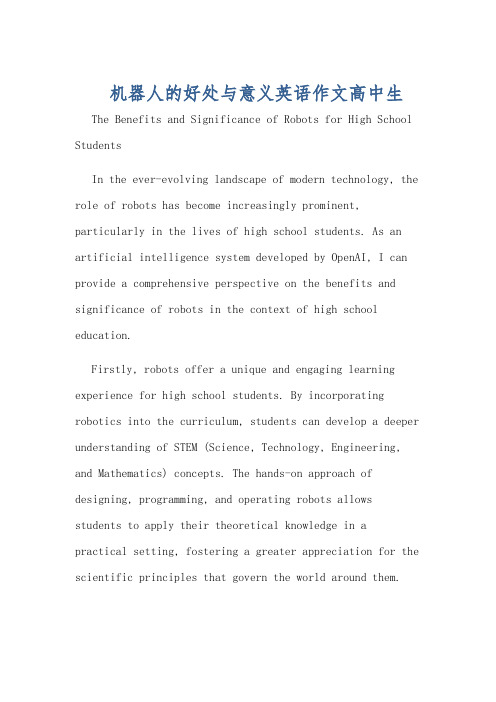
机器人的好处与意义英语作文高中生The Benefits and Significance of Robots for High School StudentsIn the ever-evolving landscape of modern technology, the role of robots has become increasingly prominent, particularly in the lives of high school students. As an artificial intelligence system developed by OpenAI, I can provide a comprehensive perspective on the benefits and significance of robots in the context of high school education.Firstly, robots offer a unique and engaging learning experience for high school students. By incorporating robotics into the curriculum, students can develop a deeper understanding of STEM (Science, Technology, Engineering, and Mathematics) concepts. The hands-on approach of designing, programming, and operating robots allows students to apply their theoretical knowledge in apractical setting, fostering a greater appreciation for the scientific principles that govern the world around them.Moreover, the integration of robots in high school education can significantly enhance problem-solving and critical thinking skills. The process of designing and programming a robot requires students to break down complex problems, analyze data, and devise innovative solutions. This cognitive exercise not only strengthens their analytical abilities but also encourages them to think creatively and outside the box, preparing them for the challenges they may face in their future academic and professional pursuits.In addition to the academic benefits, robots can also play a crucial role in developing valuable soft skills among high school students. Teamwork and collaboration are essential when working on robotic projects, as students must learn to communicate effectively, delegate tasks, and coordinate their efforts to achieve a common goal. This collaborative environment fosters the development of interpersonal skills, which are highly sought after in the modern workforce.Furthermore, the exposure to robotics can inspire high school students to pursue careers in the STEM fields. Bywitnessing the real-world applications of robotics, students may be motivated to explore various technological and scientific disciplines, potentially leading to the emergence of the next generation of innovators and problem-solvers.Beyond the educational realm, robots also hold immense significance for the future of society. As technology continues to advance, robots are poised to play an increasingly vital role in various industries, from manufacturing and healthcare to transportation and disaster response. By nurturing an interest and understanding of robotics in high school, students can become better equipped to navigate and contribute to the technological advancements that will shape the world they inherit.In conclusion, the benefits and significance of robots for high school students are multifaceted. From enhancing STEM education to fostering essential soft skills and inspiring future careers, the integration of robotics in high school curricula can have a profound and lasting impact on the personal and professional development of students. As an AI assistant, I believe that embracing thepower of robotics in education is a crucial step towards preparing the next generation for the challenges and opportunities of the future.机器人的好处与意义作为一个由 OpenAI 开发的人工智能系统,我能够为高中生提供一个全面的观点,阐述机器人在高中教育中的好处和意义。
机器人好处英语作文
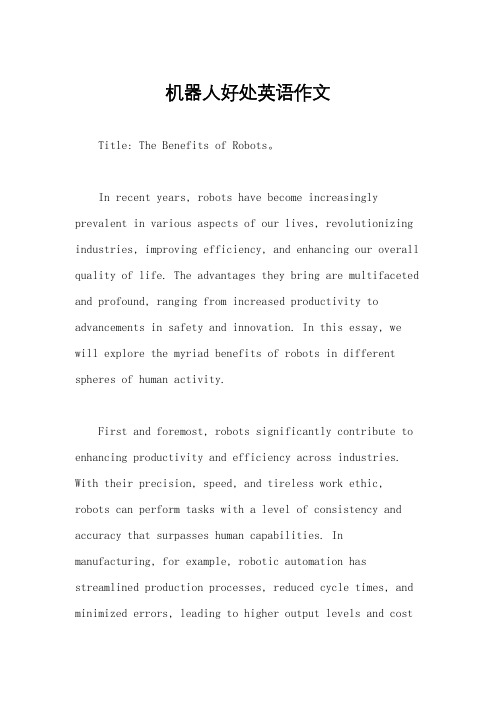
机器人好处英语作文Title: The Benefits of Robots。
In recent years, robots have become increasingly prevalent in various aspects of our lives, revolutionizing industries, improving efficiency, and enhancing our overall quality of life. The advantages they bring are multifaceted and profound, ranging from increased productivity to advancements in safety and innovation. In this essay, we will explore the myriad benefits of robots in different spheres of human activity.First and foremost, robots significantly contribute to enhancing productivity and efficiency across industries. With their precision, speed, and tireless work ethic, robots can perform tasks with a level of consistency and accuracy that surpasses human capabilities. In manufacturing, for example, robotic automation has streamlined production processes, reduced cycle times, and minimized errors, leading to higher output levels and costsavings for companies.Moreover, robots play a crucial role in improving workplace safety by undertaking hazardous or physically demanding tasks. In environments such as factories, mines, and construction sites, robots can handle tasks that pose risks to human workers, thereby reducing the incidence of workplace accidents and occupational hazards. By delegating dangerous tasks to robots, employers can prioritize thewell-being of their workforce and create safer working environments.Furthermore, robots contribute to driving innovationand technological advancement across various sectors. Through ongoing research and development, engineers and scientists continue to push the boundaries of robotics, resulting in the creation of increasingly sophisticated machines capable of performing a diverse range of functions. From autonomous vehicles and surgical robots to household assistants and companion robots for the elderly, the possibilities for innovation are vast and transformative.In addition to their impact on industries, robots also offer numerous benefits in everyday life. In healthcare,for instance, robotic technologies have revolutionized medical procedures, enabling minimally invasive surgeries, precise diagnostics, and targeted drug delivery. Robotic exoskeletons assist individuals with mobility impairments, enhancing their independence and quality of life. Moreover, in education, robots serve as valuable tools for STEM (science, technology, engineering, and mathematics) education, fostering creativity, problem-solving skills, and technological literacy among students.Another significant advantage of robots is their potential to address societal challenges, such as labor shortages and aging populations. With demographic shifts leading to a dwindling workforce in certain regions, robots can fill essential roles in industries facing shortages of skilled labor, thereby sustaining economic growth and competitiveness. Additionally, as populations age and the demand for healthcare services rises, robots can complement human caregivers by providing assistance with daily tasks, monitoring vital signs, and offering companionship to theelderly.Furthermore, robots have the capacity to mitigate environmental impact and promote sustainability efforts. In agriculture, for example, robotic systems enable precision farming practices, optimizing resource use, minimizing waste, and reducing the environmental footprint of food production. Similarly, in transportation, the development of autonomous vehicles holds the promise of reducingtraffic congestion, improving fuel efficiency, and lowering emissions, contributing to cleaner and more sustainable urban mobility.In conclusion, the benefits of robots are manifold and far-reaching, encompassing improvements in productivity, safety, innovation, and quality of life across various sectors. As technology continues to advance, the role of robots in society will undoubtedly expand, offering solutions to complex challenges and shaping the future of work, healthcare, education, and beyond. Embracing the potential of robotics entails leveraging their capabilitiesto create a more efficient, inclusive, and sustainable world for generations to come.。
有关机器人好处的英语作文
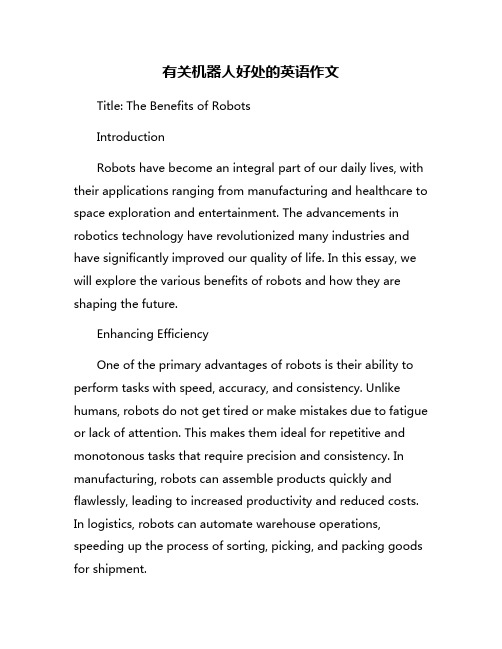
有关机器人好处的英语作文Title: The Benefits of RobotsIntroductionRobots have become an integral part of our daily lives, with their applications ranging from manufacturing and healthcare to space exploration and entertainment. The advancements in robotics technology have revolutionized many industries and have significantly improved our quality of life. In this essay, we will explore the various benefits of robots and how they are shaping the future.Enhancing EfficiencyOne of the primary advantages of robots is their ability to perform tasks with speed, accuracy, and consistency. Unlike humans, robots do not get tired or make mistakes due to fatigue or lack of attention. This makes them ideal for repetitive and monotonous tasks that require precision and consistency. In manufacturing, robots can assemble products quickly and flawlessly, leading to increased productivity and reduced costs. In logistics, robots can automate warehouse operations, speeding up the process of sorting, picking, and packing goods for shipment.Improving SafetyRobots are also instrumental in hazardous environments where human presence can be risky or even life-threatening. For example, in the field of nuclear decommissioning, robots are used to handle radioactive materials and perform tasks in areas with high levels of radiation that are unsafe for humans. In mining, robots can explore deep underground or underwater mines, reducing the risks of accidents and injuries for human workers. In healthcare, robots can assist in surgeries, minimizing the possibility of human errors and improving patient outcomes.Enhancing PrecisionRobots are equipped with sensors and cameras that enable them to perceive and interact with their surroundings with precision and accuracy. This capability is particularly valuable in industries such as agriculture, where robots can plant seeds, apply fertilizers, and harvest crops with minimal damage to the soil. In construction, robots can perform tasks such as bricklaying and welding with the highest level of precision, ensuring that structures are built to exact specifications. In the automotive industry, robots can paint cars with a flawless finish and assemble intricate components with incredible precision.Enabling InnovationRobots are driving innovation in various fields by pushing the boundaries of what is possible. In space exploration, robots are used to explore distant planets and moons, collect samples, and conduct experiments in environments that are inhospitable to humans. In the field of artificial intelligence, robots are being developed with the ability to learn, adapt, and make decisions autonomously. These advancements have the potential to revolutionize industries such as healthcare, transportation, and finance by making processes more efficient, cost-effective, and user-friendly.Creating New OpportunitiesDespite concerns about robots replacing human jobs, the rise of robotics technology has also created new opportunities for employment and entrepreneurship. As robots become more prevalent in society, there is a growing demand for skilled workers who can design, build, program, and maintain robots. This has led to the emergence of new job roles in robotics engineering, software development, and data analysis. Additionally, robots have enabled the creation of new businesses that offer services such as robot repair, customization, and training.ConclusionIn conclusion, robots have proven to be invaluable tools that are transforming industries, improving safety, enhancing precision, enabling innovation, and creating new opportunities for growth and development. As robotics technology continues to evolve, it is essential for us to embrace the potential benefits of robots while also addressing the challenges and ethical considerations that come with their widespread adoption. By leveraging the power of robots responsibly, we can harness their capabilities to build a brighter future for humanity.。
为什么喜欢机器人的英语作文
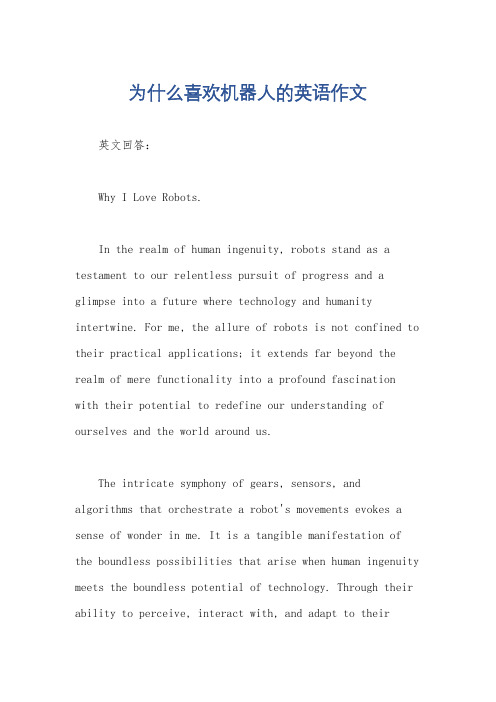
为什么喜欢机器人的英语作文英文回答:Why I Love Robots.In the realm of human ingenuity, robots stand as a testament to our relentless pursuit of progress and a glimpse into a future where technology and humanity intertwine. For me, the allure of robots is not confined to their practical applications; it extends far beyond the realm of mere functionality into a profound fascination with their potential to redefine our understanding of ourselves and the world around us.The intricate symphony of gears, sensors, and algorithms that orchestrate a robot's movements evokes a sense of wonder in me. It is a tangible manifestation of the boundless possibilities that arise when human ingenuity meets the boundless potential of technology. Through their ability to perceive, interact with, and adapt to theirsurroundings, robots possess a unique perspective that challenges our preconceived notions of intelligence and consciousness.Moreover, robots offer an unprecedented opportunity for collaboration and exploration. They can venture into hazardous environments beyond the reach of humans, enabling us to unravel the secrets of uncharted territories and push the boundaries of scientific discovery. In fields such as medicine, robots can assist surgeons with delicate procedures, enhancing precision and reducing the risk of human error. Their ability to process vast amounts of data with lightning speed allows them to make complex, data-driven decisions that would be impossible for humans to achieve on their own.Beyond their practical utility, robots have the potential to redefine our relationship with technology and ourselves. In a world increasingly mediated by screens and algorithms, robots offer a tangible, physical connection to the digital realm. They can serve as companions, providing emotional support and assistance in daily tasks. Byinteracting with robots, we can gain a deeper understanding of our own humanity, exploring the boundaries between the artificial and the natural, the human and the machine.The development of robots is not without its challenges and ethical considerations. As with any technology, thereis a potential for misuse or unintended consequences. However, I believe that the benefits of embracing robotsfar outweigh the risks. By investing in responsible research and development, we can harness the transformative power of robots to create a future where humanity and technology coexist harmoniously, empowering us to address some of the most pressing challenges of our time.In conclusion, my love for robots stems from their boundless potential to revolutionize our understanding of ourselves, our world, and our relationship with technology. Their intricate design, impressive capabilities, and potential for collaboration and exploration captivate my imagination and inspire me to dream of a future where humans and robots work together to create a better world.中文回答:为什么我酷爱机器人。
你认为机器人如何改变我们的生活英语作文
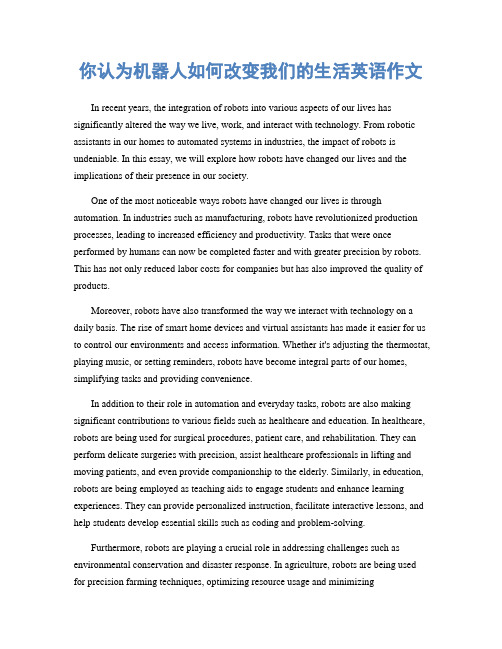
你认为机器人如何改变我们的生活英语作文In recent years, the integration of robots into various aspects of our lives has significantly altered the way we live, work, and interact with technology. From robotic assistants in our homes to automated systems in industries, the impact of robots is undeniable. In this essay, we will explore how robots have changed our lives and the implications of their presence in our society.One of the most noticeable ways robots have changed our lives is through automation. In industries such as manufacturing, robots have revolutionized production processes, leading to increased efficiency and productivity. Tasks that were once performed by humans can now be completed faster and with greater precision by robots. This has not only reduced labor costs for companies but has also improved the quality of products.Moreover, robots have also transformed the way we interact with technology on a daily basis. The rise of smart home devices and virtual assistants has made it easier for us to control our environments and access information. Whether it's adjusting the thermostat, playing music, or setting reminders, robots have become integral parts of our homes, simplifying tasks and providing convenience.In addition to their role in automation and everyday tasks, robots are also making significant contributions to various fields such as healthcare and education. In healthcare, robots are being used for surgical procedures, patient care, and rehabilitation. They can perform delicate surgeries with precision, assist healthcare professionals in lifting and moving patients, and even provide companionship to the elderly. Similarly, in education, robots are being employed as teaching aids to engage students and enhance learning experiences. They can provide personalized instruction, facilitate interactive lessons, and help students develop essential skills such as coding and problem-solving.Furthermore, robots are playing a crucial role in addressing challenges such as environmental conservation and disaster response. In agriculture, robots are being used for precision farming techniques, optimizing resource usage and minimizingenvironmental impact. In disaster situations, robots can be deployed for search and rescue missions, navigating through hazardous environments to locate and assist survivors.Despite the numerous benefits that robots bring, their increasing presence also raises concerns about job displacement, privacy, and ethical implications. As robots become more advanced and capable of performing a wider range of tasks, there is a risk of job loss for workers in certain industries. Additionally, the collection of data by robots and smart devices raises privacy concerns regarding the security and use of personal information. Moreover, there are ethical considerations surrounding the development and use of autonomous robots, particularly in areas such as warfare and decision-making.In conclusion, robots have significantly changed our lives in various ways, from automation and convenience to innovation and assistance in critical tasks. While their presence offers numerous benefits, it also presents challenges that need to be addressed. As we continue to integrate robots into our society, it is essential to carefully consider the implications and ensure that their development is guided by ethical principles and concerns for the well-being of humanity.。
机器人对生活重要性英语作文
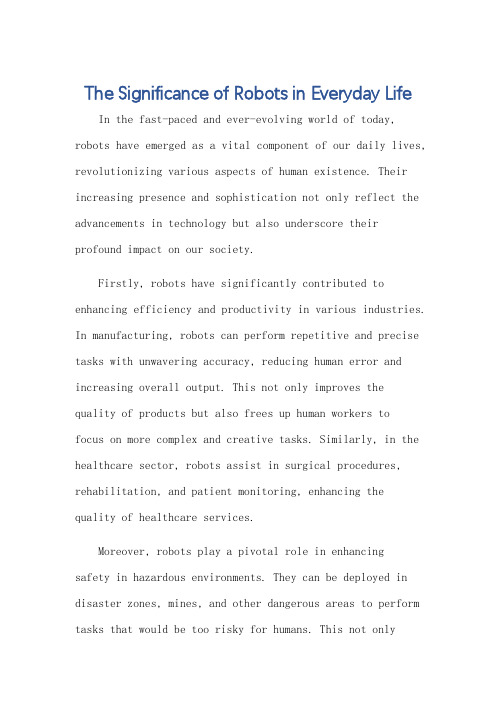
The Significance of Robots in Everyday LifeIn the fast-paced and ever-evolving world of today, robots have emerged as a vital component of our daily lives, revolutionizing various aspects of human existence. Their increasing presence and sophistication not only reflect the advancements in technology but also underscore their profound impact on our society.Firstly, robots have significantly contributed to enhancing efficiency and productivity in various industries. In manufacturing, robots can perform repetitive and precise tasks with unwavering accuracy, reducing human error and increasing overall output. This not only improves thequality of products but also frees up human workers tofocus on more complex and creative tasks. Similarly, in the healthcare sector, robots assist in surgical procedures, rehabilitation, and patient monitoring, enhancing thequality of healthcare services.Moreover, robots play a pivotal role in enhancingsafety in hazardous environments. They can be deployed in disaster zones, mines, and other dangerous areas to perform tasks that would be too risky for humans. This not onlyprotects human lives but also ensures that critical work is carried out efficiently and effectively.Furthermore, robots have become invaluable companions and assistants in our daily lives. From household robots that help with cleaning, cooking, and childcare to elderly care robots that provide companionship and assistance with daily activities, they are making our lives easier and more convenient. These robots not only enhance our quality of life but also provide a sense of companionship and support, especially for those who live alone or have limited social interactions.However, it is important to note that the integration of robots into our lives also poses certain challenges and ethical considerations. Concerns about job displacement, privacy, and the potential misuse of robots are legitimate and need to be addressed. It is crucial to ensure that the development and deployment of robots are guided by ethical principles and regulations that safeguard the rights and well-being of individuals.Despite these challenges, the overall impact of robots on our lives is overwhelmingly positive. They are not onlyenhancing our efficiency and productivity but alsoimproving our quality of life and safety. As technology continues to evolve, we can expect robots to become even more capable and integrated into our daily lives, making them an indispensable part of our future.**机器人对日常生活的重要性**在日新月异、不断演进的当今世界中,机器人已成为我们日常生活中不可或缺的重要组成部分,深刻改变着人类生活的方方面面。
机器人的好处与意义英语作文
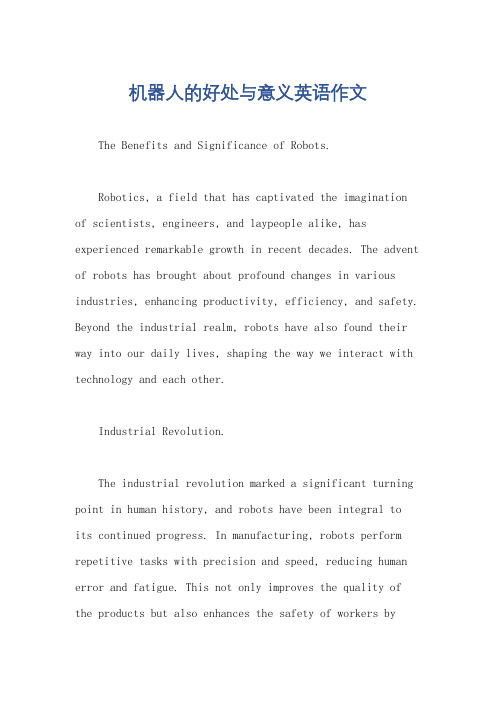
机器人的好处与意义英语作文The Benefits and Significance of Robots.Robotics, a field that has captivated the imagination of scientists, engineers, and laypeople alike, has experienced remarkable growth in recent decades. The advent of robots has brought about profound changes in various industries, enhancing productivity, efficiency, and safety. Beyond the industrial realm, robots have also found their way into our daily lives, shaping the way we interact with technology and each other.Industrial Revolution.The industrial revolution marked a significant turning point in human history, and robots have been integral toits continued progress. In manufacturing, robots perform repetitive tasks with precision and speed, reducing human error and fatigue. This not only improves the quality of the products but also enhances the safety of workers byremoving them from potentially hazardous environments.Moreover, robots are capable of working around the clock, without the need for breaks or sleep. This allowsfor continuous production, increasing overall output and profitability. In addition, robots can be programmed to adapt to changing production requirements, making them highly flexible and versatile.Healthcare Transformation.The healthcare industry has also benefited immensely from the integration of robots. Surgical robots, for instance, provide surgeons with unprecedented precision and control, enabling more complex and delicate procedures to be performed with greater accuracy. This not only improves patient outcomes but also reduces the recovery time.Robots are also being used in rehabilitation therapy, assisting patients in regaining motor functions following strokes or other neurological injuries. They can provide personalized therapy sessions, tailored to the specificneeds of each patient, ensuring that they receive the optimal level of care.Domestic Assistance.In our homes, robots have begun to perform a range of tasks that were traditionally done by humans. Domestic robots can clean floors, mow lawns, and even cook meals. This not only saves time but also frees up individuals to pursue other activities or simply relax.As technology advances, we can expect robots to become even more integrated into our daily lives. They could potentially assist with childcare, elderly care, and even provide emotional support. In essence, robots could become trusted companions, enhancing the quality of life for millions of people.Education and Entertainment.Robotics has also made its way into the world of education and entertainment. Robotics clubs andcompetitions鼓励年轻人培养创新能力和批判性思维, 同时为他们提供了一个学习科技原理和实践技能的平台。
为什么喜欢机器人的英语作文
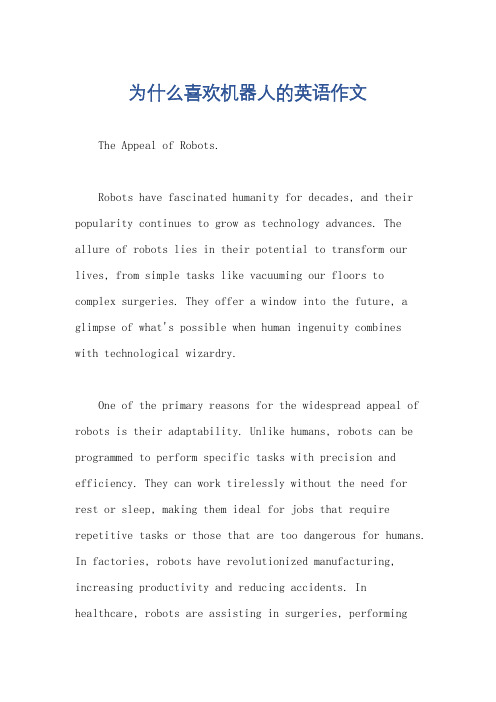
为什么喜欢机器人的英语作文The Appeal of Robots.Robots have fascinated humanity for decades, and their popularity continues to grow as technology advances. The allure of robots lies in their potential to transform our lives, from simple tasks like vacuuming our floors to complex surgeries. They offer a window into the future, a glimpse of what's possible when human ingenuity combineswith technological wizardry.One of the primary reasons for the widespread appeal of robots is their adaptability. Unlike humans, robots can be programmed to perform specific tasks with precision and efficiency. They can work tirelessly without the need for rest or sleep, making them ideal for jobs that require repetitive tasks or those that are too dangerous for humans. In factories, robots have revolutionized manufacturing, increasing productivity and reducing accidents. In healthcare, robots are assisting in surgeries, performingdelicate operations with unwavering precision.Another reason for the popularity of robots is their ability to engage us intellectually. Building and programming robots requires a deep understanding of computer science, engineering, and mathematics. It's a challenging pursuit that tests our problem-solving skills and creativity. As we design and interact with robots,we're forced to think outside the box, to consider new and innovative ways to solve problems. This intellectual engagement is not just limited to the creators of robots; even those who use robots in their daily lives find themselves engaged in a constant dialogue with their machines, learning to understand their capabilities and limitations.Robots also offer a unique form of companionship. With increasingly sophisticated artificial intelligence, robots are becoming better at understanding and responding to human emotions. They can listen patiently, offer advice, and even provide a sense of security. For those who feel isolated or lonely, a robot companion can provide a senseof connection and companionship that might not be available otherwise.Moreover, robots have the potential to revolutionize education. They can be programmed to teach a wide range of subjects in a way that is engaging and interactive. Robots can provide personalized learning experiences, adapting their teaching methods to the needs and abilities of individual students. They can also create safe environments for students to experiment and learn, without the risk of harm.The future of robots is incredibly exciting. As technology continues to evolve, we can expect robots to become even more autonomous, intelligent, and capable. They will play an increasingly important role in our lives, helping us to solve problems, improve efficiency, and enhance our quality of life.In conclusion, the appeal of robots lies in their adaptability, intellectual engagement, companionship, and educational potential. They offer a glimpse into a futurewhere technology and humanity can coexist harmoniously, where machines are not just tools but also partners in our journey towards progress and innovation. As we continue to explore the possibilities of robots, we can look forward to a brighter, more connected, and more efficient future.。
robot的好处英语作文
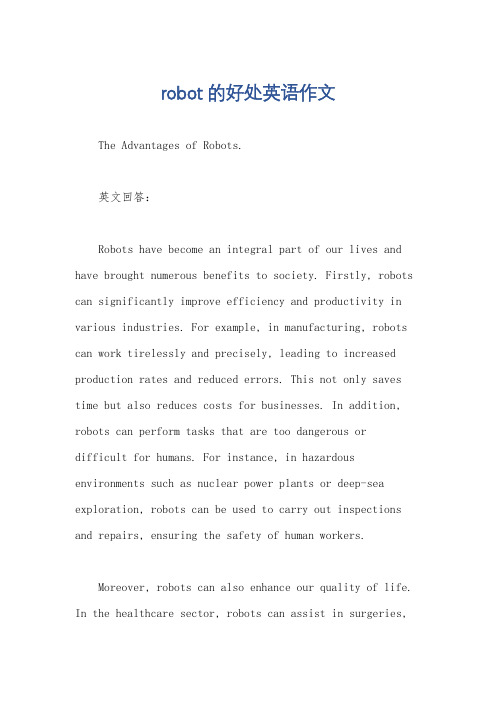
robot的好处英语作文The Advantages of Robots.英文回答:Robots have become an integral part of our lives and have brought numerous benefits to society. Firstly, robots can significantly improve efficiency and productivity in various industries. For example, in manufacturing, robots can work tirelessly and precisely, leading to increased production rates and reduced errors. This not only saves time but also reduces costs for businesses. In addition, robots can perform tasks that are too dangerous ordifficult for humans. For instance, in hazardous environments such as nuclear power plants or deep-sea exploration, robots can be used to carry out inspections and repairs, ensuring the safety of human workers.Moreover, robots can also enhance our quality of life. In the healthcare sector, robots can assist in surgeries,enabling surgeons to perform complex procedures with greater precision. This can result in shorter recovery times and better outcomes for patients. Additionally, robots can provide companionship and support for theelderly or individuals with disabilities. They can help with daily tasks, monitor vital signs, and even offer emotional support, improving the overall well-being of individuals who may otherwise feel isolated or dependent on others.Furthermore, robots can contribute to environmental sustainability. With their efficiency and accuracy, robots can optimize energy consumption and reduce waste. For example, in agriculture, robots can precisely apply fertilizers and pesticides, minimizing the use of chemicals and reducing the impact on the environment. Additionally, robots can be used for waste management and recycling, sorting materials more efficiently and promoting a circular economy.In conclusion, robots bring numerous advantages to society. They enhance productivity, perform tasks that aretoo dangerous or difficult for humans, improve healthcare outcomes, provide companionship and support, and contribute to environmental sustainability. As technology continues to advance, the potential benefits of robots will only grow, making them an invaluable asset in various aspects of our lives.中文回答:机器人已经成为我们生活中不可或缺的一部分,并为社会带来了许多好处。
关于机器人对人类有利的英语作文
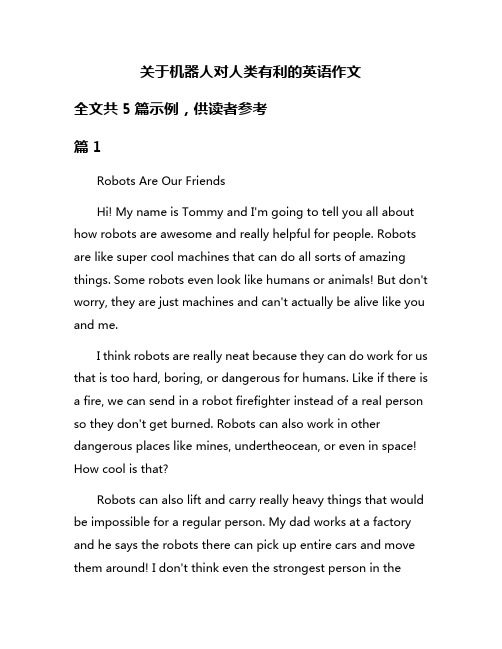
关于机器人对人类有利的英语作文全文共5篇示例,供读者参考篇1Robots Are Our FriendsHi! My name is Tommy and I'm going to tell you all about how robots are awesome and really helpful for people. Robots are like super cool machines that can do all sorts of amazing things. Some robots even look like humans or animals! But don't worry, they are just machines and can't actually be alive like you and me.I think robots are really neat because they can do work for us that is too hard, boring, or dangerous for humans. Like if there is a fire, we can send in a robot firefighter instead of a real person so they don't get burned. Robots can also work in other dangerous places like mines, undertheocean, or even in space! How cool is that?Robots can also lift and carry really heavy things that would be impossible for a regular person. My dad works at a factory and he says the robots there can pick up entire cars and move them around! I don't think even the strongest person in theworld could do that. The robots make sure all the workers stay safe and don't have to lift anything too heavy.Another reason robots are great is because they never get bored or tired like we do. They can work on the same task over and over again without stopping or making mistakes. My mom is a nurse and she says robots can help by giving the right amount of medicine to patients exactly when they need it. Nursing is a really important job, so it's good the robots can help and not mess anything up.Robots are also really smart and can think through complex problems way faster than humans. They use computer programs to calculate the best solution in just seconds or minutes. We have robot helpers that can tutor kids in math, science, and more. I'm not that good at math, so I'm glad the robots can explain it to me in a way I understand.Some robots can even perform surgery on people! Can you imagine a robot being your doctor? It sounds kind of scary, but these medical robots are actually way more precise than human surgeons. They have excellent control and can make tiny,careful movementsinside your body. Robots helping with operations leads to way fewer mistakes.I could go on and on about all the jobs robots can do, but I'll stop here for now. Maybe someday every person will have their own robot assistant to help out around the house! Robots are just tools that make our lives easier and better. As long as they have been programmed properly, they are 100% safe.Of course, we still need human workers for a whole bunch of things that robots can't do. Things like creating art, teaching lessons, and making big decisions are still jobs only people can do for now. But it's getting harder and harder to tell what robots will be capable of in the future! I think it's going to be a robot world out there someday.So those are some of the reasons why I think robots are so awesome and helpful. If you're still nervous about robots, just remember that they only do what we program them to do. Humans are in charge and will always be smarter than the most intelligent robot.Robots strengthen our abilities and take over our tough dirty work. They make our lives more productive and enriched. We just have to be careful with how we design future robots' instruction sets. As long as the robots obey our laws and values, having them around is only going to make the world better!篇2Robots Are Really Cool and Help People a LotHi, my name is Jamie and I'm going to tell you about how awesome robots are and all the cool ways they help people. Robots are basically just machines that can move and do things by themselves without a person controlling them directly. We've had basic robots for a long time, like the robot arms that build cars in factories. But these days, robots are getting much smarter and more advanced.Robots can do jobs that are too dangerous for humans. For example, there are robot bomb squads that can go check out and disable bombs and other explosives. That's way safer than a human going up to a bomb! Robots can also go into areas with toxic fumes or radiation where it's not safe for people. Some robots even help put out fires or look for people trapped after disasters like earthquakes.There are also lots of robots that do jobs in space. It's really expensive and difficult to send astronauts up in rockets, but we can send robot spacecraft and rovers to explore other planets and moons. The Mars rovers like Curiosity roam around taking pictures and studying the surface to help us learn about Mars.And robotic spacecraft have visited almost every planet in our solar system to photograph and scan them.Robots also help make manufacturing and industry a lot more efficient. Giant robot arms can build things like cars, electronics, and machinery much faster and with higher quality than humans can. And there are robots that can weld, paint, sort products, and do all sorts of tasks in factories. Other robots help lay pipes, dig holes, demolish buildings, and handle heavy construction jobs.In science, robots let us study things too small or too large for humans to experience. Super tiny nanorobots could one day travel inside the human body to deliver medicine or do microsurgery. And gigantic robots could explore the depths of the oceans or even go into volcanoes and other dangerous environments that we can't fit into or survive in.Everyday life is getting more convenient thanks to robots too. There are robot vacuum cleaners that can clean your house automatically. And there are robots designed just to be fun companions, like the little dog robots that can roll around, play fetch, and do tricks. Some robots can even help take care of elderly people who need assistance with chores and staying active. Pretty cool, right?In the future, robots are going to become even more amazing. We're developing self-driving cars that are way smarter than human drivers and will make the roads safer. And we're working on humanoid robots that can do physical work while looking and moving just like real people. That way robots could do dangerous construction or firefighting jobs instead of putting humans at risk.There are robots being built to assist with surgery, so they'll be able to help doctors do operations more precisely and quickly. And there are even robot tutors that can help teach kids like me using personalized lesson plans. As robots get smarter artificial intelligence, they'll be able to understand us better and help out in all kinds of new ways.Of course, robots aren't perfect and we have to be careful with them. We don't want killer robot armies going around hurting people! And we need to make sure robots are programmed with ethics so they'll always prioritize helping and protecting humans. But overall, I think robots are incredible inventions that make our lives so much easier, safer, and more exciting.Whether it's exploring other planets, helping doctors, cleaning our homes, or working in dangerous environments,robots can do amazing jobs that would be difficult or impossible for us humans. As their capabilities keep expanding, I can't wait to see what incredible new robot helpers will be developed next. Robots are simply awesome!篇3Robots Are Really Cool and Helpful!Hi, my name is Jamie and I'm going to tell you all about how awesome robots are! Robots are like really cool machines that can do all sorts of amazing things. They might seem kind of scary because they aren't human, but robots are actually really helpful for people.One way robots help is they can do jobs that are too dangerous for humans. Like if there is a fire or an exploding volcano, we can send in robots instead of people so no one gets hurt. Robots don't need to breathe air or worry about getting burned up. They are made of super strong metal that protects them.Robots are also great for exploring places humans can't easily go, like under the ocean or out in space. We have special waterproof robots that can dive way down deep to explore the ocean floor and shipwrecks. We also have robots on Mars thatcruise around and take lots of pictures and measurements. That's so cool!Another awesome thing about robots is they never get tired like humans do. We get sleepy at night but robots can work 24 hours a day, 7 days a week without ever needing a break. That means they can get way more work done in factories and on assembly lines to build stuff for us. Hooray for robots making our lives easier!But robots aren't just for dangerous stuff or working hard nonstop. They can also be lots of fun! A lot of kids have little robot toys that can walk and talk. Some bigger robots can even play sports and games. I saw a video of a robot playingping-pong and it was so good at hitting the ball over the net. Robots might beat humans at games one day!Speaking of the future, robots are going to be super important as they get smarter and smarter. Robots will be able to do almost any job a human can do. But don't worry, that doesn't mean robots will take over the world and get rid of people! Humans are still way smarter than robots overall and we get to tell the robots what to do. I think robots and humans can work together as a great team.Like if you are a scientist or doctor, you could program a robot to be your assistant. It would be able to keep track of all your notes, calculations, and data way better than any human could. Or say you are a artist, you could have a robot that paints or sculpts for you and creates amazing artwork. With robots to help, we humans can focus on the creative ideas and let the robots do the hard work. Sounds like a dream, right?Of course, we do need to be a little bit careful with robots too. If robots get too smart, they might try to outsmart their human creators. That's why scientists always have failsafe switches to shut down robots if they start going haywire. As long as we're careful, robots will only make our lives easier, not harder.Another tiny downside is that robots run on electricity which isn't eco-friendly if you get that power from coal or oil. But we're getting better at solar and wind power, so eventually robots could get energy from clean sources that don't hurt the planet. Pretty cool!In the end, robots are just machines that can't actually think and feel like humans. They are tools to help make our lives more fun and easier. We are lucky to be living in an age with such awesome robot helpers! I'm really excited to see what new robottechnologies get invented in the future. Maybe one day every house will have a robot maid to clean and do chores. Or every school could have a robot teacher to make learning more fun. How amazing would that be?So those are my thoughts on why robots are so awesome and helpful for humankind. They allow us to explore and accomplish things we could never do alone. Robots work tirelessy and obediently at our command. As long as we treat robots like the tools they are, they will only make our lives better and more efficient. I can't wait until I'm older and robots are everywhere! Bring on our robot overlords helpers!篇4Robots Are Really Awesome for Us Humans!Hi there! My name is Jamie and I'm 10 years old. Today I want to tell you all about how totally awesome robots are and why they are so great for us humans. I really love robots and I think you will too after reading this!First of all, robots can do tons of jobs that are too hard or too dangerous for people. Like if there is a big fire or a building collapsed, we can send in robot firefighters and rescue bots to help instead of putting human firefighters at risk. Robots don'tmind smoke, flames, or getting crushed by falling debris. They are made of super tough stuff.Robots can also go places that are impossible for humans, like the deepest parts of the ocean or even on other planets! We have these really cool underwater robots that can explore the ocean floor and take pictures and samples from miles below the surface. And we just sent a robot rover named Perseverance to explore Mars and look for signs of ancient life. How neat is that?!Another big way robots help us is by doing jobs that are just way too repetitive, precise, or boring for humans to want to do. Imagine having to install tiny microchips onto computer boards, one by one, for hours and hours. That would make anyone go cross-eyed! But robots never get bored or tired. They can do that kind of tiny, precise job over and over without a single mistake.Or think about big factories that build cars, appliances, toys and stuff. Robots on the assembly lines can weld, paint, lift heavy things, and put everything together perfectly every single time. If humans had to do all that, products would not be as good and they would cost a lot more too.Robots are also amazing helpers for people with disabilities. There are robot arms that can help people get dressed, eat meals, turn pages in a book, and all sorts of things if their own armsdon't work well. There are even robot legs and walker type robots that can help people get around if they are unable to walk. How liberating for those people!But helping people is just one way robots are awesome. They can also help the whole planet by being better for the environment than humans. See, robots don't pollute the air by driving gas-powered cars or trucks. Their robot "engines" run on clean electricity instead of gross gas and oil. And they don't waste energy turning lights or electronics on and off when not needed.In factories, robot workers mean a lot fewer humans are needed, so there are way fewer cars on the road putting out stinky emissions. And robots don't eat food, live in homes, or do other human stuff that creates a lot of trash and environmental damage. As long as we keep building better robot tech, robots will keep getting greener and greener.I haven't even gotten to the most fun part - how robots can entertain us! There are amazing robot toys that can walk, dance, tell jokes, and play all sorts of games with you. Some robot toys even let you program and control them yourself with a special computer. Toys like that are both fun and let you learn about coding.Speaking of coding, robots are also incredible teaching tools for kids like me to learn programming, math, engineering, and other brainy stuff through playing with them. By building and coding robots, we get hands-on experience with technology in a fun, engaging way. Who knows, maybe writing code for robots will inspire some of us to become engineers, computer programmers, or even robotics scientists when we grow up!There are also robots being developed that can do awesome entertainment things like play sports, instruments in bands or orchestras, act in movies or theater shows, or even create art or music compositions! Wouldn't it be so cool to see an all-robot rock band or plays with robot actors? The future of robot entertainment is going to be insane.Of course, robots aren't perfect and we need to be careful about certain things with them too. Some jobs are still much better for humans to do, like jobs involving a lot of creativity, emotions, or working directly with people's feelings and needs. Things like teaching, counseling, nursing, and therapy are good examples of human-required jobs. At least for now, robots just aren't able to handle those kinds of human-to-human interactions and emotional sides.We also need to make sure robots have really good security and can't get hacked by bad people to do bad things. And we need clear rules about robots only being used for good, safe purposes - not for harming or replacing humans entirely. As long as robots just help out humans though and not try to take over everything, it will be great.Okay, I could probably go on and on about why robots are so awesome, but I'm getting a little robot-rambled out. The main thing is, robots are super helpful for doing hard jobs, going to extreme places, assisting people with disabilities, being environmentally-friendly, entertaining us, and teaching us. Thanks to robots, our lives are easier, safer, and a whole lot cooler!I hope you can see now why robots are really one of the most amazing technologies we humans have created. Let's keep on developing robots to make the world an even better place. I don't know about you, but I can't wait for the robot future! It's going to be so incredibly awesome! Robots rule!篇5Robots are Super Cool and Helpful!Have you ever wished you had a robot to help you with your chores or homework? Robots are really awesome machines that can do all sorts of amazing things. They're like having a super cool friend who never gets tired and can lift really heavy things! Let me tell you about some of the ways robots help make our lives easier and better.First of all, robots can do jobs that are too dangerous for humans. For example, there are robots that help put out fires or explore inside volcanoes. These robots can withstand extreme heat and walk through flames or over hot lava without getting hurt. Firefighter robots have special hoses and tools to spray water and chemicals on the fire. Volcano explorer robots have cameras and sensors to study the volcanic activity up close. Humans couldn't safely do these jobs, but the robots can!Robots also work in factories to build things like cars, computers, and toys. They have big mechanical arms that can lift heavy parts, weld metal pieces together, and put tiny components in place. Robots never get bored or tired, so they can work all day and night without stopping. This helps make products faster and cheaper for people to buy.In hospitals, there are robot assistants that can help doctors and nurses. Some robots carry supplies, medications, or foodtrays to patients' rooms. Other robots can perform very precise surgery using tiny tools that a human hand couldn't control as well. These robot surgeons mean patients have smaller incisions, heal faster, and are less likely to get infections. How cool is that?Did you know there are even robots that can go into space? NASA has sent many robots to explore planets, moons, asteroids, and other places humans can't go. The Mars rovers Spirit, Opportunity, Curiosity, and Perseverance have traveled all around Mars taking pictures and studying the red planet's surface. Some day, robots may help set up a human colony on Mars!But robots don't just work in extreme environments or big factories. You might have robot helpers right in your own home! Lots of families have robot vacuum cleaners that automatically clean the floors without anyone having to push a regular vacuum around. Some houses have robot lawn mowers that can perfectly trim the grass all by themselves.Robots can also be tons of fun. Maybe you have a little robot pet or a battle robot toy. Controllers let you program robot toys to do cool tricks, dance around, or play games. At theme parks, there are amazing robot shows with robots that walk, jump, play instruments and sing!As you can see, robots help make the world much safer, more efficient, and more fun. But that's not all they can do. Scientists and engineers are working on making robots smarter all the time. In the future, there may be robot assistants that can talk to you, run errands, do household chores, and help with homework! Maybe your teacher will even be a robot someday.oid robots that can walk, grab objects, and see just like humans are being developed. These human-like robots could do all kinds of jobs from working on construction sites to looking after older adults who need daily assistance. Personal robot companions may become as common as having a computer or smartphone.However, even super intelligent robots will still need directions from humans and something important to do. Robots don't have real feelings or consciousness like we do. They are just very advanced computers that can process information and complete tasks based on their programming. No matter how smart they get, robots will always need the creative ideas and emotional intelligence of human beings.So while robots are already extremely useful and will only get more capable, they could never fully replace humans. We shouldn't be afraid of robots taking over. Instead, we can lookforward to robots becoming more like personal assistants,co-workers, and friends that make our lives easier while we tell them what to do!Robots are awesome helpers that can go where it's too dangerous for people, build the vehicles and computers we use, perform life-saving medical treatments, and explore other planets. But they also make great playmates, coaches, tour guides, and maybe someday they'll even help you with your math homework. I can't wait to see what incredible robots get invented next!。
机器人的使用 英语作文
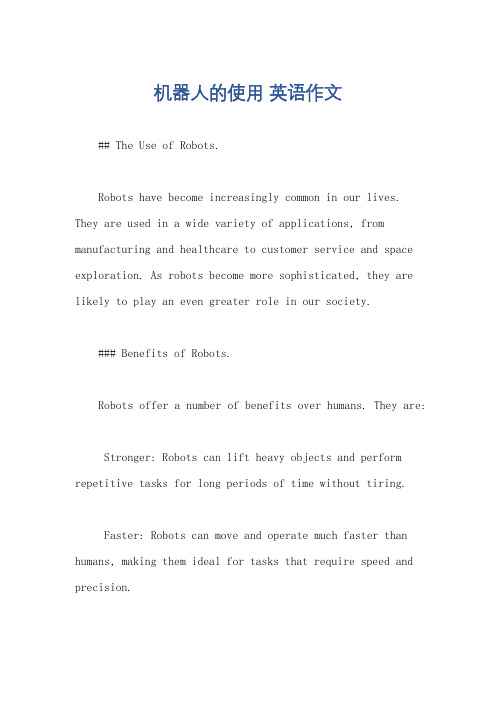
机器人的使用英语作文## The Use of Robots.Robots have become increasingly common in our lives. They are used in a wide variety of applications, from manufacturing and healthcare to customer service and space exploration. As robots become more sophisticated, they are likely to play an even greater role in our society.### Benefits of Robots.Robots offer a number of benefits over humans. They are:Stronger: Robots can lift heavy objects and perform repetitive tasks for long periods of time without tiring.Faster: Robots can move and operate much faster than humans, making them ideal for tasks that require speed and precision.More accurate: Robots can be programmed to perform tasks with a high degree of accuracy, reducing the risk of errors.More efficient: Robots can work continuously without breaks, making them more efficient than humans.Safer: Robots can be used to perform dangerous tasks, such as working in hazardous environments or handling radioactive materials.### Applications of Robots.Robots are used in a wide variety of applications, including:Manufacturing: Robots are used in factories to perform tasks such as welding, assembly, and painting.Healthcare: Robots are used in hospitals and clinics to perform surgery, dispense medication, and provide rehabilitation.Customer service: Robots are used in call centers and other customer service settings to answer questions,provide information, and resolve problems.Space exploration: Robots are used to explore other planets and moons, collect data, and perform repairs.### Challenges of Robots.While robots offer a number of benefits, there are also some challenges associated with their use. These challenges include:Cost: Robots can be expensive to purchase and maintain.Complexity: Robots can be complex to program and operate, requiring specialized knowledge and training.Safety: Robots must be designed and operated safely to avoid harming humans or property.Ethical concerns: The use of robots raises a number of ethical concerns, such as the potential for jobdisplacement and the loss of human control.### Conclusion.Robots are increasingly common in our lives, and they are likely to play an even greater role in our society in the future. However, it is important to be aware of the challenges associated with their use and to address these challenges in a responsible manner.## 机器人的使用。
机器人对未来世界的影响英语作文
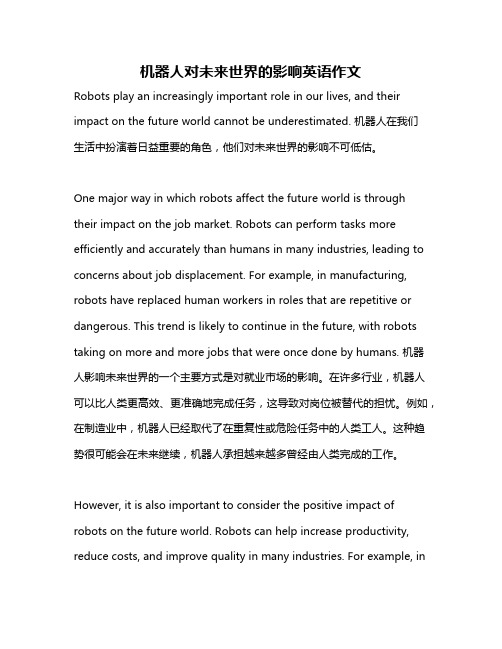
机器人对未来世界的影响英语作文Robots play an increasingly important role in our lives, and their impact on the future world cannot be underestimated. 机器人在我们生活中扮演着日益重要的角色,他们对未来世界的影响不可低估。
One major way in which robots affect the future world is through their impact on the job market. Robots can perform tasks more efficiently and accurately than humans in many industries, leading to concerns about job displacement. For example, in manufacturing, robots have replaced human workers in roles that are repetitive or dangerous. This trend is likely to continue in the future, with robots taking on more and more jobs that were once done by humans. 机器人影响未来世界的一个主要方式是对就业市场的影响。
在许多行业,机器人可以比人类更高效、更准确地完成任务,这导致对岗位被替代的担忧。
例如,在制造业中,机器人已经取代了在重复性或危险任务中的人类工人。
这种趋势很可能会在未来继续,机器人承担越来越多曾经由人类完成的工作。
However, it is also important to consider the positive impact of robots on the future world. Robots can help increase productivity, reduce costs, and improve quality in many industries. For example, inhealthcare, robots can assist surgeons in performing delicate procedures with precision, leading to better patient outcomes. In agriculture, robots can automate tasks like planting, watering, and harvesting, increasing efficiency and reducing the need for manual labor. 因此,同样重要的是要考虑机器人对未来世界的积极影响。
初三英语作文写机器人的好处
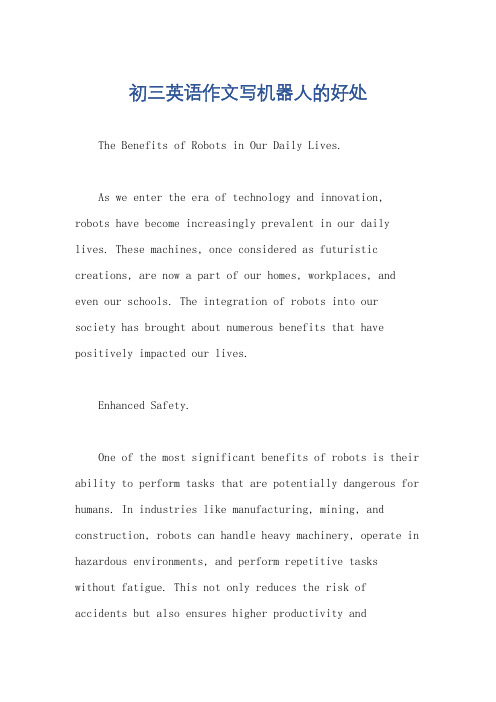
初三英语作文写机器人的好处The Benefits of Robots in Our Daily Lives.As we enter the era of technology and innovation, robots have become increasingly prevalent in our daily lives. These machines, once considered as futuristic creations, are now a part of our homes, workplaces, and even our schools. The integration of robots into our society has brought about numerous benefits that have positively impacted our lives.Enhanced Safety.One of the most significant benefits of robots is their ability to perform tasks that are potentially dangerous for humans. In industries like manufacturing, mining, and construction, robots can handle heavy machinery, operate in hazardous environments, and perform repetitive tasks without fatigue. This not only reduces the risk of accidents but also ensures higher productivity andefficiency.Improved Healthcare.Robotics has revolutionized healthcare, especially in surgical procedures. Surgical robots, with their precision and stability, can perform complex operations with greater accuracy than human hands. They can also assist in rehabilitation therapy, helping patients recover from strokes or other neuromuscular conditions. Additionally, robots can monitor patients remotely, enabling doctors to provide timely care even when they are not physically present.Increased Efficiency and Productivity.Robots are designed to perform tasks efficiently and consistently, without the need for breaks or distractions. In factories, robots can work around the clock, producing goods at a much faster rate than human workers. This not only increases production but also ensures consistent quality. In the agricultural sector, agricultural robotscan plant, water, and harvest crops more efficiently, helping farmers increase their yields.Cost Effectiveness.While robots may require a significant initial investment, they often pay for themselves over time through increased productivity, reduced labor costs, and decreased operational expenses. Robots don't require salaries, paid vacations, or sick days. They also don't tire or get distracted, which means they can work continuously without the need for supervision.Enhanced Quality Control.Robots are programmed to perform specific tasks with exact precision. This ensures that products are made to exact specifications, reducing the chances of defects or errors. In addition, robots can be programmed to inspect and test products for quality assurance, ensuring that only the best products reach the market.Improved Accessibility.Robotics has also made technology more accessible to people with disabilities. Robots can be programmed to perform tasks that are difficult or impossible for some people, such as reaching high shelves or manipulating small objects. They can also be used as assistive devices, helping people with disabilities perform daily tasks more easily.Conclusion.Robots have become an integral part of our lives, bringing about numerous benefits that have improved our safety, healthcare, productivity, efficiency, cost-effectivenesss, quality control, and accessibility. As technology continues to evolve, we can expect robots to become even more intelligent, autonomous, and adaptive, further enhancing their role in our daily lives. While there are challenges and concerns associated with the rise of robots, their benefits far outweigh the negatives, making them a valuable addition to our society.。
机器人对人类未来的影响英文作文
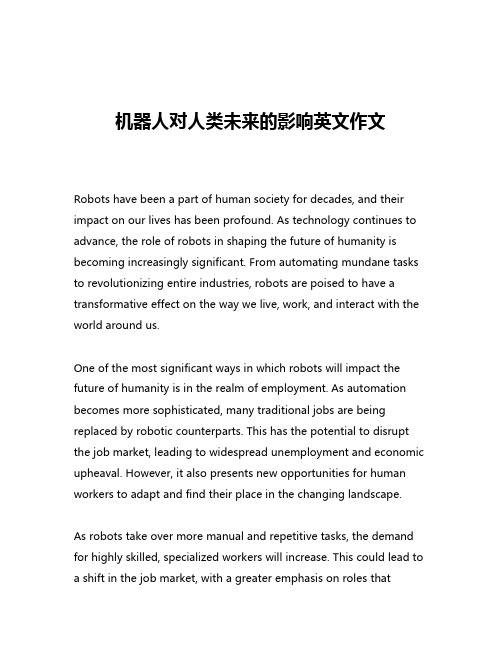
机器人对人类未来的影响英文作文Robots have been a part of human society for decades, and their impact on our lives has been profound. As technology continues to advance, the role of robots in shaping the future of humanity is becoming increasingly significant. From automating mundane tasks to revolutionizing entire industries, robots are poised to have a transformative effect on the way we live, work, and interact with the world around us.One of the most significant ways in which robots will impact the future of humanity is in the realm of employment. As automation becomes more sophisticated, many traditional jobs are being replaced by robotic counterparts. This has the potential to disrupt the job market, leading to widespread unemployment and economic upheaval. However, it also presents new opportunities for human workers to adapt and find their place in the changing landscape.As robots take over more manual and repetitive tasks, the demand for highly skilled, specialized workers will increase. This could lead to a shift in the job market, with a greater emphasis on roles thatrequire creativity, critical thinking, and complex problem-solving skills. In this new paradigm, education and lifelong learning will become increasingly important, as workers will need to constantly update their skills to remain competitive.Furthermore, the integration of robots into the workforce could lead to significant improvements in efficiency and productivity. By automating tasks that are time-consuming, error-prone, or physically demanding, robots can free up human workers to focus on more strategic and innovative endeavors. This could result in increased output, reduced costs, and greater overall competitiveness for businesses and industries that embrace this technology.Another area where robots will have a significant impact is in the realm of healthcare. Robotic technologies are already being used in medical procedures, such as surgery and rehabilitation, to improve precision, reduce recovery times, and enhance patient outcomes. As these technologies continue to evolve, we may see robots playing an even more prominent role in the delivery of healthcare services, from assisting with routine tasks to providing personalized care and support for the elderly and those with disabilities.The integration of robots into healthcare could also lead to advancements in medical research and drug development. Robots can be programmed to perform repetitive and tedious tasks, such asconducting experiments, analyzing data, and screening for potential drug candidates. This could accelerate the pace of scientific discovery and lead to breakthroughs in the treatment of various diseases and conditions.Beyond the workplace and healthcare, robots are also poised to have a significant impact on our everyday lives. Domestic robots, such as vacuum cleaners, lawn mowers, and smart home assistants, are already becoming more commonplace, and their capabilities are only expected to grow. As these technologies become more advanced and affordable, they could revolutionize the way we manage our homes and daily routines, freeing up time and energy for other pursuits.Moreover, the development of autonomous vehicles, such as self-driving cars and drones, could transform the way we travel and transport goods. These technologies have the potential to reduce traffic congestion, improve road safety, and provide greater mobility for those who are unable to drive. As these systems become more reliable and widely adopted, they could have a profound impact on urban planning, infrastructure, and the way we design our cities.However, the increasing presence of robots in our lives also raises important ethical and societal considerations. As robots become more intelligent and autonomous, questions arise about their moralstatus, the potential for bias and discrimination, and the impact on human employment and social structures. These issues will need to be carefully addressed through robust policymaking, public discourse, and the development of ethical frameworks to guide the responsible development and deployment of robotic technologies.In conclusion, the impact of robots on the future of humanity is multifaceted and far-reaching. While the integration of robots into our lives presents significant challenges, it also offers tremendous opportunities for innovation, efficiency, and improved quality of life. As we navigate this technological revolution, it will be crucial for policymakers, researchers, and the public to work together to ensure that the development and implementation of robotic technologies are aligned with our values, priorities, and long-term well-being. By embracing the potential of robots while addressing the associated risks and ethical concerns, we can shape a future where humans and robots coexist in a mutually beneficial and sustainable way.。
关于机器人的影响英文作文
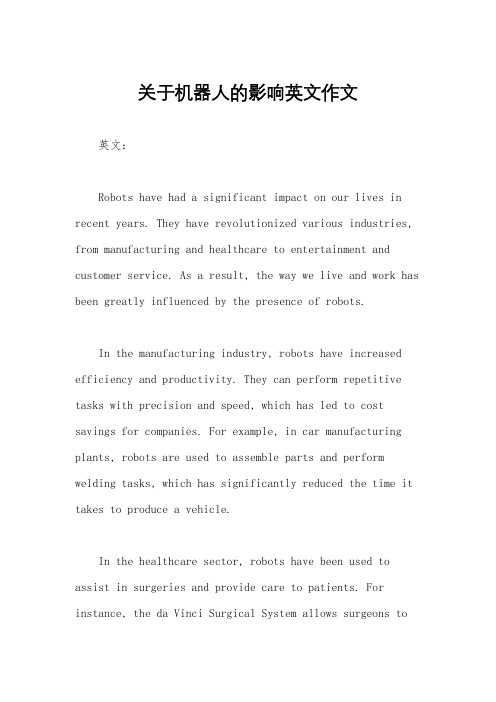
关于机器人的影响英文作文英文:Robots have had a significant impact on our lives in recent years. They have revolutionized various industries, from manufacturing and healthcare to entertainment and customer service. As a result, the way we live and work has been greatly influenced by the presence of robots.In the manufacturing industry, robots have increased efficiency and productivity. They can perform repetitive tasks with precision and speed, which has led to cost savings for companies. For example, in car manufacturing plants, robots are used to assemble parts and perform welding tasks, which has significantly reduced the time it takes to produce a vehicle.In the healthcare sector, robots have been used to assist in surgeries and provide care to patients. For instance, the da Vinci Surgical System allows surgeons toperform minimally invasive surgeries with the help ofrobotic arms and a 3D high-definition vision system. This has resulted in faster recovery times and reduced complications for patients.In the entertainment industry, robots have been used to create lifelike characters in movies and theme park attractions. For example, Disney's animatronic figures are able to interact with guests and perform complex movements, providing a more immersive experience for visitors.Furthermore, robots have also impacted customer service, with chatbots being used to handle customer inquiries and provide assistance on websites and social media platforms. These chatbots are able to respond to customer queries in real time, improving the overall customer experience.In addition to these examples, the presence of robots has also raised concerns about job displacement and ethical considerations. Many fear that the increasing use of robots will lead to job losses, particularly in industries that heavily rely on manual labor. There are also ethicalconcerns surrounding the use of robots in warfare and surveillance, as well as the potential for robots to surpass human intelligence.Overall, the impact of robots on our lives is undeniable. While they have brought about numerous benefits in terms of efficiency and convenience, it is important to carefully consider the potential drawbacks and ensure that the integration of robots into our society is done in a responsible and ethical manner.中文:机器人在近年来对我们的生活产生了重大影响。
关于机器人的英语话题作文
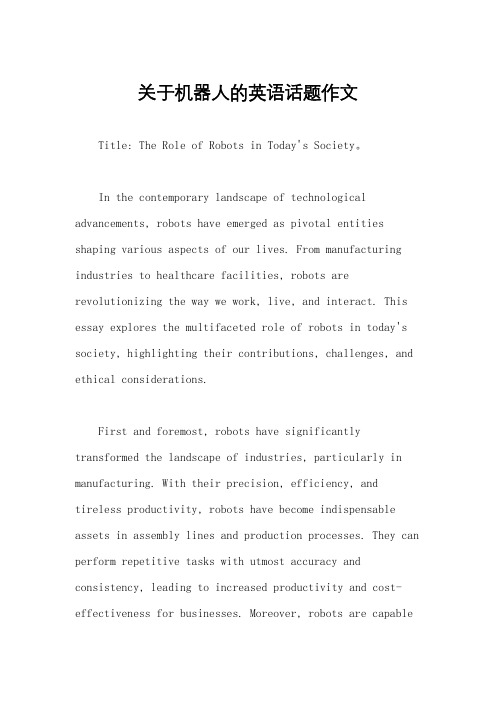
关于机器人的英语话题作文Title: The Role of Robots in Today's Society。
In the contemporary landscape of technological advancements, robots have emerged as pivotal entities shaping various aspects of our lives. From manufacturing industries to healthcare facilities, robots are revolutionizing the way we work, live, and interact. This essay explores the multifaceted role of robots in today's society, highlighting their contributions, challenges, and ethical considerations.First and foremost, robots have significantly transformed the landscape of industries, particularly in manufacturing. With their precision, efficiency, and tireless productivity, robots have become indispensable assets in assembly lines and production processes. They can perform repetitive tasks with utmost accuracy and consistency, leading to increased productivity and cost-effectiveness for businesses. Moreover, robots are capableof handling hazardous tasks that pose risks to human workers, thereby ensuring workplace safety and minimizing occupational hazards.Furthermore, robots have revolutionized the healthcare sector, offering innovative solutions to medical challenges. Surgical robots, for instance, enable surgeons to perform complex procedures with enhanced precision and minimal invasiveness. This not only reduces the risk of complications but also facilitates quicker recovery timesfor patients. Additionally, robots are employed in rehabilitation therapy, assisting individuals with mobility impairments to regain strength and independence. By augmenting the capabilities of healthcare professionals, robots contribute to improved patient outcomes and qualityof care.In addition to their industrial and medical applications, robots are increasingly integrated into everyday life, enhancing convenience and efficiency. Domestic robots, such as robotic vacuum cleaners and lawn mowers, automate household chores, allowing individuals toallocate their time and energy to more meaningful activities. Moreover, service robots in hospitality and retail sectors streamline customer interactions and optimize service delivery. Through their ability to perform routine tasks autonomously, robots empower individuals to focus on tasks that require human creativity and emotional intelligence.Despite their numerous benefits, the widespread adoption of robots raises ethical and societal concernsthat warrant careful consideration. One such concern is the potential impact of automation on employment opportunities. As robots increasingly assume tasks traditionally performed by humans, there is a risk of job displacement and economic inequality. It is imperative for policymakers to implement measures that ensure a smooth transition for displaced workers and promote inclusive economic growth.Furthermore, the autonomy and decision-making capabilities of robots give rise to ethical dilemmas, particularly in fields such as autonomous vehicles and military robotics. Questions surrounding accountability,liability, and moral reasoning in robotic decision-making require interdisciplinary collaboration and ethical frameworks to navigate. Additionally, there is a need to address issues of privacy and data security in the era of pervasive robotics, safeguarding individuals' rights and autonomy.In conclusion, robots play a pivotal role in shaping contemporary society, offering innovative solutions to various challenges while raising ethical and societal concerns. From manufacturing and healthcare to everyday life, robots have become indispensable assets, augmenting human capabilities and enhancing efficiency. However, the widespread adoption of robots necessitates careful consideration of their implications, including their impact on employment, ethics, and societal well-being. By embracing a holistic approach that balances technological advancement with ethical considerations, we can harness the transformative potential of robots to create a more inclusive and sustainable future.。
- 1、下载文档前请自行甄别文档内容的完整性,平台不提供额外的编辑、内容补充、找答案等附加服务。
- 2、"仅部分预览"的文档,不可在线预览部分如存在完整性等问题,可反馈申请退款(可完整预览的文档不适用该条件!)。
- 3、如文档侵犯您的权益,请联系客服反馈,我们会尽快为您处理(人工客服工作时间:9:00-18:30)。
The importance of robots
As the development of economic and technology,there are different types of robots designed to make our life convenient.Because we don’t learn about the robot very much and can’t define it ,people have different opinions.Recently,the discussion heats up.
People in favor of it hold that three important reasons,First of all, they think it is robots that can perform number-crunching and other difficult tasks with great accuracy and speed than human minds ever could.Secondly, it is robots that can be utilized to do some dangerous tasks for human beings in high risk businesses like mining and st but not least,it is robots that do heavy tasks so that people could enjoy more leisure time.
Opponents also have strongly evidence to support their opinions.They observed that if robots take their places,especially in the mass production industry,people will lose jobs and huge pressure on the labor market and government will appear.They observed that if people use the machines widely in their life ,people will be less smart because of using their brain less.They observed
that if we are tolerate in robots, it will become the most advanced war weapon in the world.
As far as I’m concerned,we can’t deny the advantages of the robot,even if there are many disadvantages of the robot.What we must know is that we are the people who make the machine which will be machine forever only if we always develop ourselves.。
